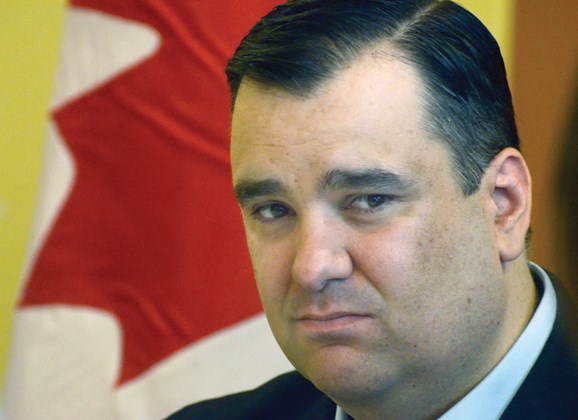The government minister who has the final decision on whether three controversial new cell towers will be built along Highway 1 in West Vancouver says their approval is not a fait accompli.
"We do our own independent assessment on each tower, their proximity to things, whether or not there's a public safety aspect," said Industry Minister James Moore. "We
do listen. Cell towers are not automatically approved. We can put in mitigation. We can design setbacks. There are different things we've done in the past. There's also an obligation on the companies to listen to the public."
Moore was in North Vancouver Friday, along with West Vancouver-Sunshine Coast-Sea to Sky MP John Weston, to talk to businesses about the benefits they'll reap from Wednesday's speech from the throne.
Rogers has applied to build three 36-metre towers on provincial land at Taylor Way, 15th Street and 26th Street to boost the wireless data coverage of three cell phone companies. Capacity crowds turned out to town hall meetings hosted by the District of West Vancouver earlier this month where the towers were roundly panned as health risks, view spoilers and anchors on property values. Several residents expressed disbelief that the District of West Vancouver was powerless to veto the towers, if council was so inclined.
The health concerns raised by residents at the two town hall meetings are "not an uncommon anxiety," Moore said, but added it is up to Rogers to justify the science and allay local fears.
"There were a lot of fears that were raised over smart meters and the science was proven quite clearly that smart meters were not a threat in any way to public health. Cell phone towers are a different technology but companies have to demonstrate that there is no public health concern," he said.
Rubbishing the towers would result in less coverage, more dropped calls and slower Internet, all of which would spell harm for small businesses, Moore added.
"There's a cost to saying no," he said.
And Moore pointed out, cell towers are now more regulated than they were in the past, including a requirement that cell companies share towers to keep them from proliferating needlessly across the country.
"If it wasn't for our government, there could be a dozen towers coming up on the North Shore without proper community consultation," he said.
While Industry Canada has the final veto, the public opposition expressed at the recent town hall meetings was not a waste, Weston said.
"The reason the district had these meetings is because it knows it has an influential say and it did a good job in opening the doors to very actively engaged public meetings.
...That is critical so the individuals on the North Shore understand what's going on and feel that they are part of the process, rather than being manipulated," he said. "When the process is finished, I'll be sure to brief the minister independently on what I've seen from the people in the community."



